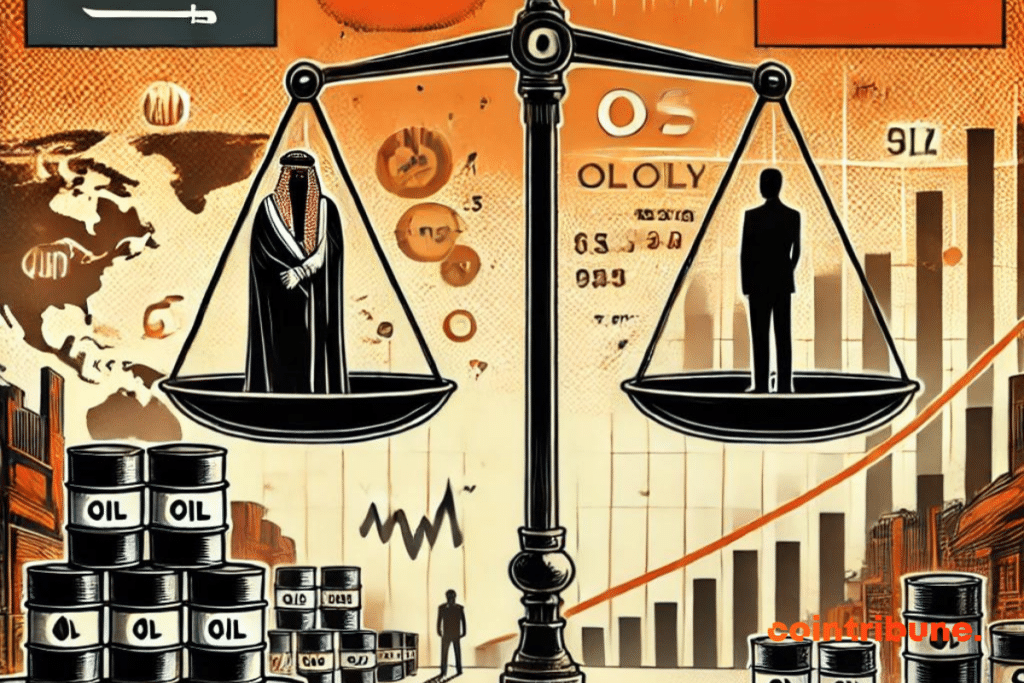19:00 ▪
4
min reading ▪ acc
Amid a period of global economic volatility, Saudi Arabia has made a decision that could well define the energy and geopolitical balance. When the price of oil reached $100 per barrel, Riyadh decided to significantly increase its oil production, a move aimed at lowering oil prices on international markets.

Saudi strategy to lower oil prices
Saudi Arabia, a new BRICS member and the world’s largest oil exporter, has announced a substantial increase in its production to put pressure on the price of a barrel, currently at $100. Described as a response to market volatility, the strategy aims to calm inflationary concerns plaguing many global economies. According to Riyadh’s official statements, this decision is justified by the need to “maintain the balance of energy prices and support global economies.” The gesture also represents a break with the current production cut policy adopted by OPEC+ and BRICS to maintain high prices on the one hand and absolute control over global oil production on the other.
Saudi Arabia’s decision is all the more critical as the global economy is going through a period of great uncertainty. Such an increase in supply could quickly lead to a drop in oil prices, which would directly affect the income of other producing countries, especially Russia. For Moscow, whose oil revenues make up a substantial part of the state budget, this new drop in prices could exacerbate economic difficulties caused by Western sanctions and further reduce its ability to finance its operations in Ukraine.
Russia is facing new economic pressure
The increase in production in Saudi Arabia and the subsequent drop in oil prices could mean a big blow to Russia, whose economy is heavily dependent on the export of hydrocarbons. This potential drop in oil prices directly threatens the Kremlin’s revenues and would further weaken an economy already weakened by Western economic sanctions. A longer drop in oil prices could thus reduce Russian tax revenues by several billion dollars, which would mean problems with financing public expenditures and especially the war in Ukraine.
Faced with this potential loss of revenue, Russia will have to turn to alternatives and unconventional solutions to keep capital flowing.
The increase in Saudi oil production and the resulting drop in the price of a barrel are not without consequences for the Russian economy. Already weakened by sanctions and the war in Ukraine, Russia now faces a cut in its oil revenues, which could further deepen its economic woes. However, one can only hope that this situation will not further increase tensions within the BRICS group, to which these two powerful oil producers belong.
Maximize your Cointribune experience with our “Read and Earn” program! Earn points for every article you read and get access to exclusive rewards. Register now and start reaping the benefits.
A graduate of Sciences Po Toulouse and holder of the blockchain consultant certification issued by Alyra, I joined the Cointribune adventure in 2019. Convinced of the potential of blockchain to transform many sectors of the economy, I made a commitment to raise awareness and inform the general public about this ever-evolving ecosystem. My goal is to enable everyone to better understand blockchain and take advantage of the opportunities it offers. Every day I try to provide an objective analysis of current events, decipher market trends, convey the latest technological innovations and put into perspective the economic and social problems of this ongoing revolution.
DISCLAIMER OF LIABILITY
The comments and opinions expressed in this article are solely those of the author and should not be considered investment advice. Before making any investment decision, do your own research.

